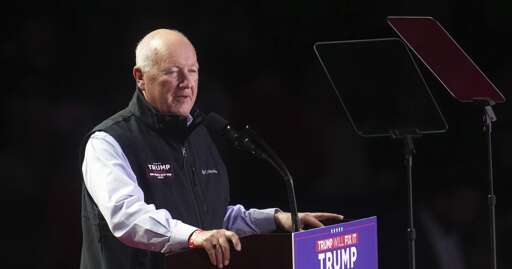Ottawa should block Donald Trump’s chosen ambassador to Canada until the U.S. president stops questioning Canada’s sovereignty, says one expert.
“We could potentially use (this) as a way of signalling the seriousness with which the Government of Canada is viewing this unwelcome talk,” said University of Victoria international relations professor Will Greaves.
“It is an overt, aggressive policy that (Trump) seems to be shifting his administration to endorse. And if we are remotely serious as a country, we should regard that as a hostile action and embrace a wider array of tools in our response towards it.”



Delaying tariffs is worse than having them.
Canadians can’t price orders to US companies or price any cross border deliveries.
Tariffs are functionally in effect as long as the axe swings over our head like this.
If I were in charge I’d be nailing him to the wall with 50% tariffs on EVERYTHING we ship to America. His supporters would be screaming at $8-10 per gallon of gas.
Hit him hard and force him to step back 'cause this pussy-footing around isn’t doing any good.
100%. The US does not have the domestic manufacturing capability to be swinging their stick like this and the tariffs don’t affect(directly) trade with the countries willing to play nice.
For incoming products, sure, but I don’t see how that applies to outgoing products? If we sell something to the US, and it gets a tariff applied after the sale but before delivery, it’s the receiver that has to pay the tariff, so the only risk is for multiple delivery contracts being cancelled.
We have no problems with pricing since any tariffs we put on will have advance warning unlike that buffoon that comes up with an idea and signs it in place within two days.
And those potential buyers don’t want to risk that uncertainty.
Would you agree to buy something without knowing if it might randomly cost you 25% more than the agreed price?
I agree, but once you sign the contract, you don’t have a choice, unless if there’s a clause to state that if the import cost changes, you can break the contract. But I strongly doubt most contracts include such a clause. Not that it matters much since as long as the product is delivered, customers are obligated to pay the full cost, including import taxes since they ordered the product in the first place.
And that uncertainty will be causing customers to delay orders or find other suppliers until thw chaos subsides.
To that I agree as well. Actually, several companies did that exactly when Trump first went to office and made his original threats. They already stopped taking new orders from the states due to the uncertainty.
That said, it still has no effect on already signed contracts, unless if the customer goes bankrupt while the deal is active or something (entirely possible considering the situation). Otherwise, the reliability of knowing you can renew your contracts is gone, which is why so much of Canadian products are being renegotiated to go to the EU or east Asia instead.